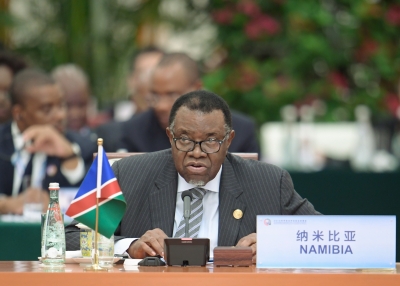Namibia President Geingob wins second term
By IANS | Published: December 1, 2019 11:04 AM2019-12-01T11:04:05+5:302019-12-01T11:10:20+5:30
Namibia's incumbent President Hage Geingob has won a second term, securing 56.3 per cent of the vote in the presidential election, the Electoral Commission of Namibia (ECN) said.

Namibia President Geingob wins second term
Geingob on Saturday defeated independent candidate Panduleni Itula, who received 29.4 per cent, Xinhua news agency reported, citing ECN.
Despite a clear victory over his nearest competitors, the levels of support for Geingob were significantly lower than in the 2014 elections, when he received 87 per cent of the popular vote.
"I wish to thank Namib for re-electing me as their president. I am humbled and commit to serve the Namibian nation with more passion and utmost dedication, to bring tangible improvements in the lives of our citizens. I have heard you," Geinob wrote on his Twitter account on Saturday morning, hours before the official results were declared.
Bernadus Swartbooi, candidate for the Landless Workers' Movement - centered on complaints against the unequal land ownership system - only secured 2.7 per cent of the votes, while Esther Muinjangue, the country's first female presidential candidate, got 1.5 per cent.
True to their tradition of democratic stability, Namib voted peacefully and no major incidents were reported apart from some technical problems with the electronic voting machines.
Meanwhile, Namibia's South West African People's Organisation (SWAPO) gained control of parliament after securing 63 of the 96 seats in the legislative elections held on Wednesday along with the presidential polls.
The party's support in the legislature also fell from the 77 seats it had obtained in 2014.
This former anti-colonial movement has ruled the country since it achieved independence from South Africa in 1990.
Throughout Namibia's history, SWAPO has continued to expand its power across the country, but this time the predictions were not as optimistic and it was believed that Geingob could face a difficult journey to revalidating the presidency.
Although the ruling party did not face prominent rivals and was counting on securing a majority so that Geingob could lead the country into a second five-year term, the elections were marred by corruption scandals and economic hardship many in the country face.
There has been discontent in Namibia, especially among young people, due to a deteriorating economic outlook as despite its important mining resources, Namibia has been in recession since 2016 on account of the global collapse of raw material prices.
The International Monetary Fund has predicted that the country will begin coming out the recession only by the end of the year.
Unemployment remains at around 34 per cent and - despite the country's significant efforts to reduce poverty since the 1990s - Namibia is still one of the most unequal countries on the planet, second only to the neighboring South Africa.
Moreover, this year, a drought in southern Africa has kept almost a third of the 2.5 million population in need of government assistance.
Corruption allegations have also plagued the Geingob government despite the president's promise to combat it.
Last month, only a few days before the elections, two ministers stepped down amid allegations that they had received millions of dollars in bribes from an Iceland fishing company.
( With inputs from IANS )
Open in app